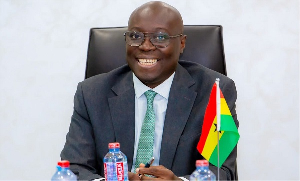Government has completed all scheduled Eurobond debt service obligations for 2025, having paid a total of US$1.17billion in coupons since concluding a US$13billion restructuring deal in October 2024.
The Ministry of Finance confirmed on Thursday, July 3 that the latest coupon payment of US$349.52million was made on July 3 through the Bank of Ghana (BoG), bringing the country’s Eurobond servicing record fully up to date for the year.
This follows earlier payments of US$475.6million in October 2024 and another US$349.52million during January 2025.
“This timely payment reaffirms Ghana’s commitment to macroeconomic stability, prudent debt management and constructive engagement with external creditors,” the ministry said in a statement.
Officials believe the consistency in post-restructuring debt servicing could help improve the nation’s sovereign credit profile and support its bid to regain access to international capital markets. The ministry noted that such discipline is expected to positively influence credit rating assessments and investor sentiment in the months ahead.
The country completed restructuring its Eurobond obligations last year under a market-led process aimed at easing near-term repayment pressures and aligning debt service with its medium-term fiscal framework. The current schedule indicates a steep rise in external payments next year, with US$1.41billion in Eurobond debt service due in 2026.
Ahead of this month’s coupon payment, the nation received US$360million in budgetary support from the World Bank, approved on June 29, 2025 under the Second Resilient Recovery Development Policy Financing programme.
The funding is intended to bolster fiscal and external buffers and support reforms aimed at restoring macroeconomic stability.
The World Bank disbursement also comes in anticipation of another US$370million from the International Monetary Fund, contingent on Executive Board approval scheduled for July 7. Combined, the two inflows bring at least US$730million in expected foreign exchange support this month – resources that the BoG has incorporated into its liquidity and reserve management plans.
Foreign reserves stood at over US$11billion as of end-June, equivalent to five months of import cover. The central bank has stated that this buffer has been built deliberately, supported by programme-related inflows, domestic foreign exchange (FX) purchases and a strategic external debt service plan that prioritises market confidence.
Government officials continue to underscore the importance of maintaining the post-restructuring payment schedule as a means of anchoring investor expectations and avoiding renewed financial instability.
The country’s debt crisis, which peaked in 2022, forced authorities to suspend payments on external debt and turn to the IMF for a US$3billion support programme. The subsequent Eurobond restructuring, part of a broader debt resolution process that included bilateral and commercial creditors, was seen as a milestone in the nation’s economic recovery agenda.
Savings and budgeting tools
While near-term financing needs remain substantial, officials are cautiously optimistic that improved fiscal management, revenue reforms and external support will allow Ghana to navigate upcoming debt service obligations without further market disruption.
“Our focus is to preserve the gains made so far and maintain fiscal and external discipline,” the Finance Ministry said.



